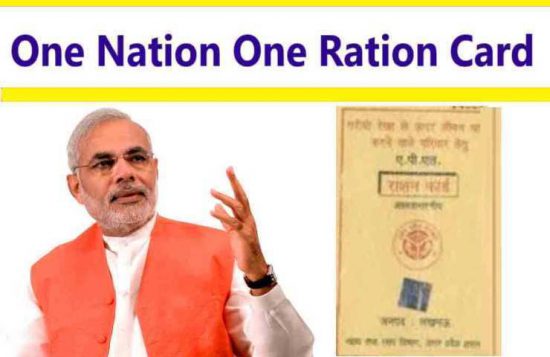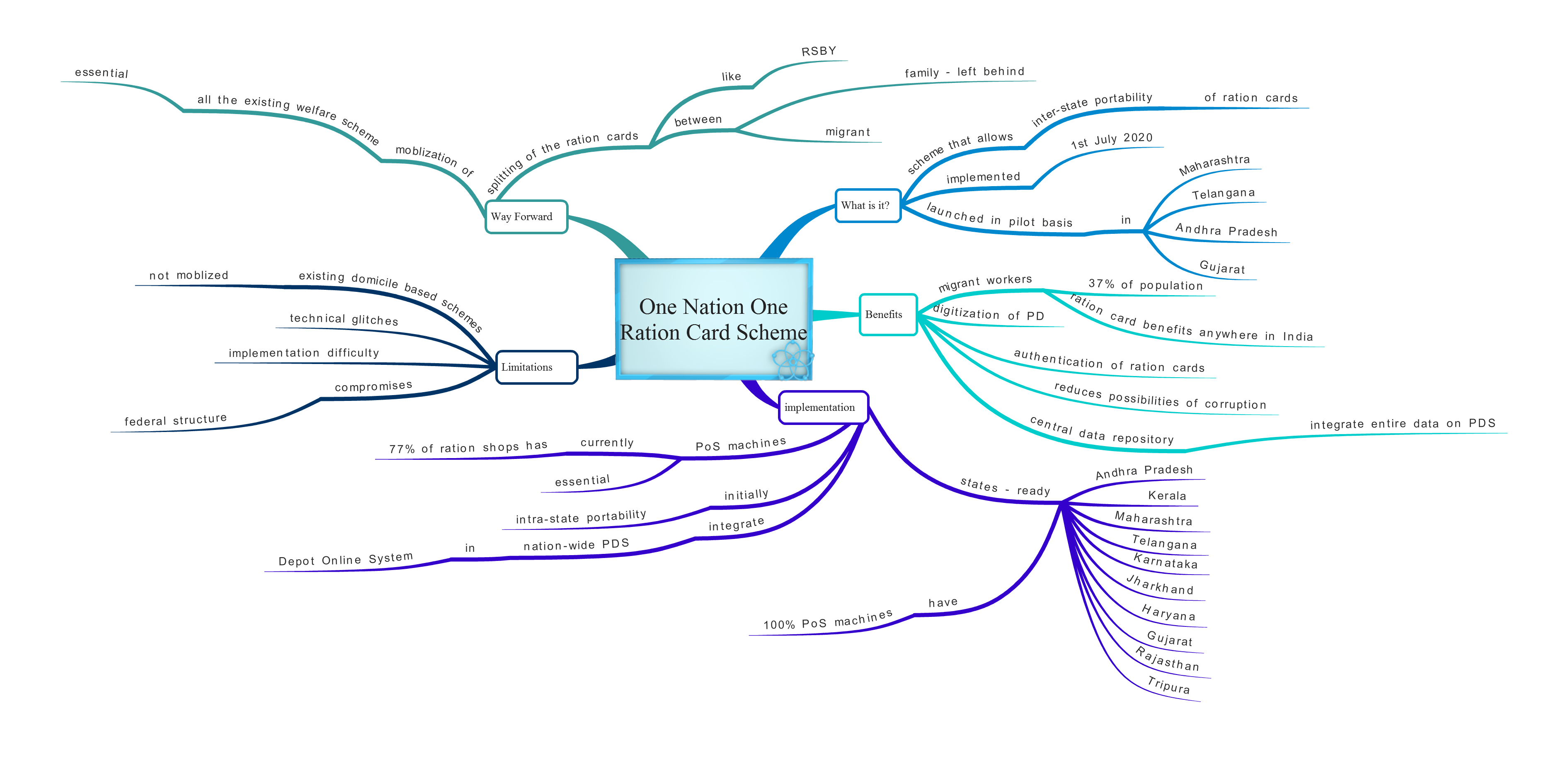One Nation, One Ration Card Scheme – Pros & Cons

From Current Affairs Notes for UPSC » Editorials & In-depths » This topic
IAS EXPRESS Vs UPSC Prelims 2024: 85+ questions reflected
India is a welfare state. This means that it is the duty of the government to ensure the protection and promotion of the economic and social well-being of its citizens. One Nation One Ration Card Scheme seeks to provide solutions to the limitations of the previous food security schemes that were domicile-based, that is, the beneficiaries can only avail for the assistance at a fixed Public Distribution System and cannot change this without undertaking prior complex procedures.
What is One Nation One Ration Card Scheme?
- This is a scheme that allows Inter-State Portability of the Ration Cards.
- A ration card is an official government document that allows certain households to purchase food grains at a subsidized rate from the Public Distribution System that comes under the National Food Security Act, 2013 (NFSA).
- NFSA or the Right to Food Act is an act that provides legality to the existing food security schemes like the Midday Meal Scheme, Integrated Child Development Services and PDS.
- The PDS came as the result of famine in 1940.
- It was revived in 1970 as a universal food security program for the whole nation.
- In 1997, when India opened its markets for globalization, the universal food security scheme was turned into a targeted program that identified the individuals who require food security from the government.
- Due to pressure from judiciary and civil society, in 2013, the National Food Security Act was implemented.
- This made the right to food a legal entitlement for two-third of the Indian population.
- As per the act, all the state governments must identify the eligible households that require subsidised food grains for survival and provide them with the ration card.
- The One Nation One Ration Card Scheme ensures that no individual is deprived of the benefits because of migration from one state to another.
- The beneficiary can avail for the same benefits in any of the public distribution system he/she wishes across the country.
- This scheme is going to be available for the whole nation 1st July 2020.
- It was initially launched in pilot basis on August in the following states: Andhra Pradesh, Telangana, Maharashtra, and Gujarat.
- These states have fully digitized their PDS operations and are fully prepared for the upcoming changes that are brought about by this scheme.
What are the benefits of this scheme?
- In India, 37% of the population is a migrant labour force.
- However, it normally takes two-three months to obtain a ration card in a new location.
- This gives losses to the migrants and reduces their efficiency.
- This scheme seeks to overcome these drawbacks by enabling the migrants to access these benefits at any part of the country.
- The authentication is made using Aadhaar verification.
How does it help the migrant labour force?
- To an economy, mobilization of the labour force is essential for the better employment opportunities and reduction of poverty.
- A majority of the poor either practice seasonal or temporary migration for their survival.
- Many estimate that about 10 crore people who work in informal sector practice seasonal rural-to-urban migration.
- The incidents of migration are caused mainly due to the recent agrarian crisis, unemployment, and poverty.
- The sectors that accommodate these migrants include construction companies, brick kilns, plantation, agriculture, manufacturing, and other informal sectors.
- However, these migrant workers still face a financial crisis as most of the anti-poverty, food security, rural employment, and other welfare schemes are mostly domicile-based access schemes.
- About 45.36 crore individuals are migrant labour force. These are mainly poor families in search of jobs.
- To reduce the unemployment rate and poverty in the cities and towns due to migration from rural areas in search of jobs, faster and efficient food security schemes are essential.
- The one nation one ration card seeks to do the same.
- This scheme also provides nutritional benefits.
- Their right to avail for government benefits will not be hindered due to migration because of this scheme.
How does this scheme help curb existing corruption?
- The Indian Government for the last five years has undertaken measures to weed out duplicate ration card.
- Due to this, the government was able to delete approximately 3 crore bogus and duplicate ration cards.
- One of the main aims of one nation one ration card scheme is to ensure authentic ration cards are used and no individual is a beneficiary in more than one location at the same time.
- This scheme is implemented by the linking of Aadhaar card and biometrics. This reduces the possibilities of corruption.
- However, the Aadhaaar card is not mandatory to access NFSA. There are other means to verify the identity of the individual.
- The government is also creating a central data repository to integrate all the data available within the states on everything related to the ration card and PDS.
- The digitized central repository ensures that no duplication or corruption is possible.
How will this scheme be implemented?
- This scheme allows for intra-state portability. As of now, ten states are ready for this scheme.
- They are Andhra Pradesh, Kerala, Telangana, Karnataka, Jharkhand, Haryana, Gujarat, Rajasthan, Maharashtra and Tripura.
- These states have 100% Point of Sale Machines and all Public Distribution Systems are connected to it.
- The availability of the PoS machines is essential to implement this scheme.
- Already, about 77% of the ration shops has been equipped with Pos machines.
- The beneficiary, because of this, can access the benefits from any of the PDS available within the state other than the one that was nominated for him.
- The government cannot directly implement this ambitious scheme that allows for the inter-state portability of the ration card without prior testing of the efficiency of this scheme.
- Therefore the intra-state portability is first undertaken to test the compatibility of the scheme.
- Thus the government is building clusters on a pilot basis.
- The government is also planning to incorporate all the Public Distribution Stems across the country with the Depot Online System.
- This gives the government complete details on the supply chain of the PDS and the distribution to the beneficiary.
What are the limitations of this scheme?
- Federal Structure: The Tamil Nadu Government argued that this scheme is against federalism. Each state has different rates. There may be divergences and objectionable consequences.
- Difficulty: The exact data on who are migrating where is essential for the efficient implementation of the scheme.
- Domicile-based legislations: The existing domicile based schemes must also be mobilized to ensure the efficiency of the scheme.
- Exclusion: Sometimes the migrant worker will travel in search of work without the family members. Those who stay behind may face a crisis because of the availability of only a single ration card.
- Technical glitches: Digitization always has limitations. There are bound to be technical problems while implementing the scheme.
Way Forward:
- The Food Security Scheme under the NFSA is highly expensive. If the food grains are not distributed in a targeted manner, then it will increase the financial burden of the government.
- The One Nation One Ration Card seeks to unify the whole nation so that there are minimum corruption and higher coverage.
- Splitting up of ration cards between those who are left behind and the one who migrates in search of work is essential to allow efficient coverage of the food security to the poor families. Rashtriya Swathya Bima Yojana (RSBY) does just that. It is a scheme that splits the unique insurance card to help the migrant as well as the family members who were left behind.
- Other welfare schemes that cover health, nutrition, etc., must also be mobilized to ensure no one is left behind from availing the assistance of the government in order to improve the ease of living of the population.
Article by: K.G.Karishma
If you like this post, please share your feedback in the comments section below so that we will upload more posts like this.


